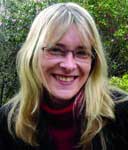Backstory
Authors tell you what inspired their work
Catherine Jinks, author of "Evil Genius"

I have a nephew called Robert. About three years ago, when Robert still quite small, I was in his bedroom with my husband Peter, and Robert's dad. As we were talking, my husband picked up Robert's Professor Gangrene doll, which had a particularly revolting, greenish face. And when my husband heard the doll's name, he said, "What I want to know is, where do all these criminal masterminds get their degrees from?" Whereupon Robert's dad immediately replied: "From the university of Evil."
Immediately, my antennae went up. That's how most writers work: we often get our best ideas from conversations like this.
I was particularly interested in what my brother, Robert's dad, had to say about this so-called University of Evil -- because he himself is a university lecturer, with a PhD in Psychology. So he knew what he was talking about when he explained how there would have to be two strands of study -- Pure Evil and Applied Evil -- and how Applied Evil would contain all the money-making courses, and how the teachers of those courses would resent the funding that went to the faculty of Pure Evil, because it wouldn't be pulling in many fee-paying students...
Anyway, I had a think about all this. I filed it away for further reflection, as I often do. But then a little while later I saw Elijah Wood playing Frodo in "The Lord of the Rings," and I remember how astonished I was at how incredibly innocent he looked. And it occurred to me, as I watched him batting those eyes on the big screen, that Elijah Wood's "Frodo" face would be a wonderful disguise for someone with evil intentions. Because it would be so hard to believe that he was the person behind all of the nasty tricks he might be playing.
At which point I remembered the "University of Evil" idea, and put the two ideas together. This is the way most books start, for me. I get one idea, then I get another, and when they come together, they germinate into a story. Kind of like the miracle of life. If I'm really lucky, one of the ideas concerns a character, and one concerns a situation. So I can stick the character into the situation, and carry on from there.
But it was a hard book to write. Because I'm not a genius, and I was writing about a genius, and I had to show how clever he was. Which meant that I had to do a lot of research into things like number theory, which I didn't understand. (Still don't, really.) Also, the point about my hero is that he's extremely good at manipulating complex systems. So my book had to be full of complex systems for him to manipulate.
That's why Evil Genius had to have such a complicated plot. Which is yet another reason why it was so hard to write. But it was fun, too, because it contains so many weird characters and bizarre situations, and because I enjoyed the mental challenge of helping my hero bring down his father's evil empire, bit by bit, simply by manipulating a person here and another person over there. For me, it was a bit like solving a really, really big puzzle. All plotting is like that, but Evil Genius was the biggest puzzle I've ever had to solve.
To learn more about Catherine Jinks and her work, visit her website.

